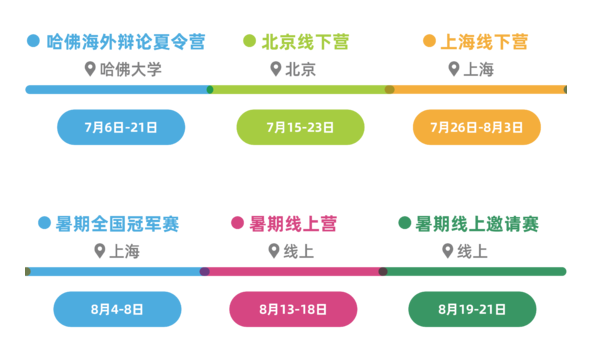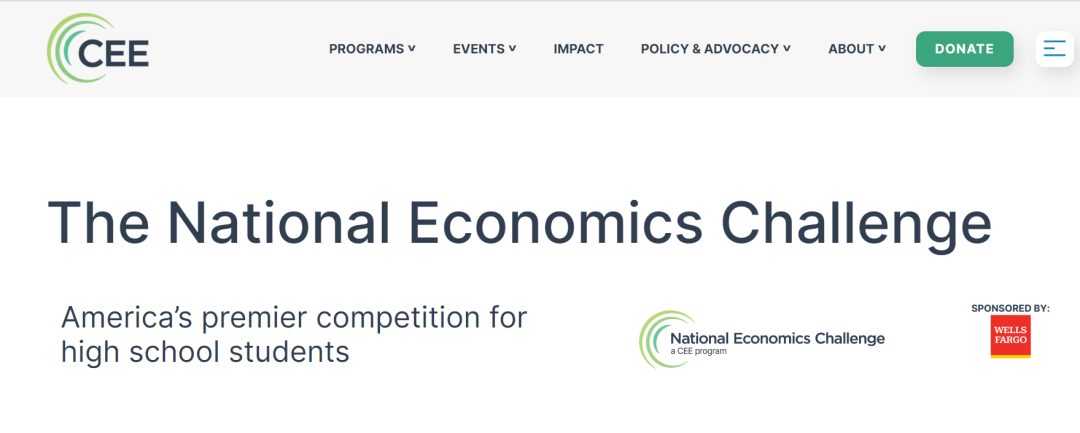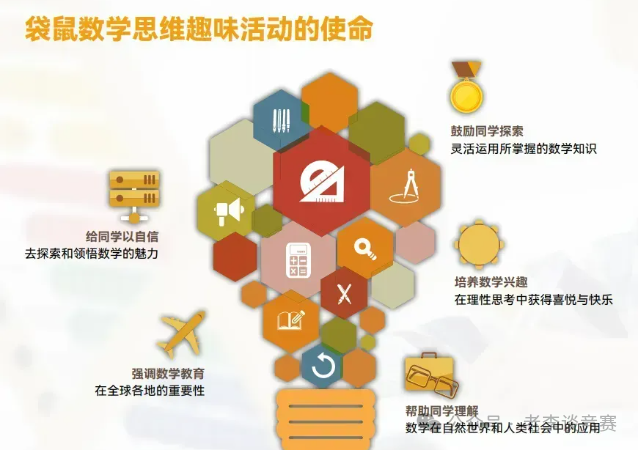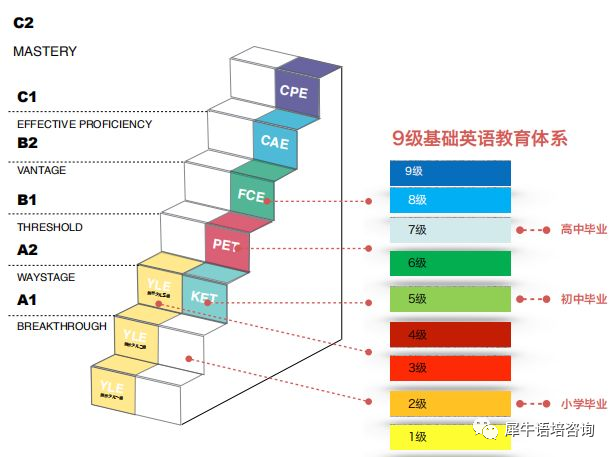
上周我们为大家发布了
满满55页的学术资料包
同学们有没有迷失在知识的海洋里?
这些文章在辩题的语境下又该如何运用?
别担心!
今天我们就为大家奉上
年度冠军赛Sample Case
帮助大家学习资料包的同时
更好地理解辩题、备战本次冠军赛!
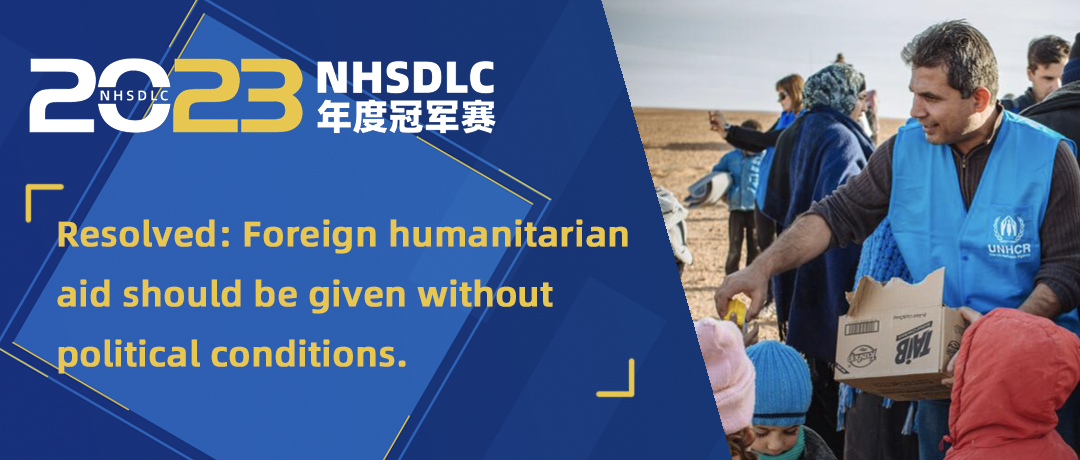
本次Sample Case向我们展示了人道主义援助的发展现状和面临的挑战,以及附带政治条件对其来说究竟有何利弊:
在正方看来,疾病、气候灾害往往发生在经济落后的不发达地区和缺乏减排计划的发展中国家,外部的人道主义援助提供资金、拯救生命的同时,能进一步改善经济和缓解气候变化带来的一系列影响。附带条件会降低援助的效率,阻碍上述人道主义援助带来的积极影响。
但在反方看来,政治条件是对外援助的必要条件。首先,对外援助属于外交关系的一部分。它不仅是外部提供援助的诱因,也有助于阻止人道主义援助实施过程中存在的腐败问题。如果没有附带条件,导致受援助国家贫困的众多问题也将无法被根治。
接下来,让我们一起看看 本次Sample Case的具体内容吧~
Sample Case
PRO
We affirm the resolution. We believe that humanitarian aid should be given without conditions.
Contention 1, health improvements.
Stonely 231 of BYU contextualizes, “In 2020, there were 602,000 recorded deaths from malaria on the African continent, making up 96% of the 627,000 malaria deaths globally.” Further, Essoungou 112 from the UN explains, 69% of the world’s least developed countries are in sub Saharan Africa, which the CDC3 explains, is where most of those who die from malaria are.
This hampers economic development in the region. Andrade et. al. 224 published through Malaria Journal: “the burden [of malaria] reached 1.1% of the GDP and 39% of the public spending on health.” Andrade furthers, “families bear most of the malaria expenditure (71%), followed by the government (20%).” Indeed, Malar 35 confirms, “In countries with a heavy malaria burden, the disease accounts for as much as 40% of public health expenditure”.
This is a macro and micro economic disaster, as it costs people not only lives, but money.
Foreign aid is a solution. Bendavid and Bhattacharya 146 quantify, “Between 1974 and 2010, each 1% increase in health aid was associated with 0.24 months greater increase in life expectancy. [...] These findings imply that an increase of $1 billion in health aid could be associated with 364 800 fewer under-5 deaths”.
We can cross apply this evidence to malaria, two reasons.
One, the USAID7 explains, since 2000, U.S. leadership alongside a concerted global effort has helped save almost 7.6 million lives and prevent more than 1.5 billion malaria cases. That’s to say, foreign aid has empirically contributed to saving lives from malaria.
Two, Bendavid 17 explains, the US President [Obama]’s Malaria Initiative, which led to “increases in the coverage of efficacious malaria interventions”, were accompanied by “an annual risk of under-five death that declined 15% more” than places without the initiative.
This corroborates that more funding is good, and less funding causes death.
Contention 2, climate change. Tetrick 188 from UMinn explains, by 2040, there will be 1.4 BILLION climate refugees. Further, Tetrick argues, this number will grow exponentially, because Wennerstein and Robbins 189 explain, a quarter of the world’s population lives near the coast. Then, Tetrick reasons, consequent migration leads to a laundry list of impacts: “overpopulation, conflict over resources, cultural clashes and increased discrimination” among many others.
This is critical. Wennerstein explains, “As a result of disasters owing to climate change, more people are being killed or displaced by landslides, cyclones, and floods than ever before.” People will die from climate change which itself is bad.
Foreign aid alleviates this, two warrants.
One, the USAID. The USAID10 explains, they “[partner] with more than 45 countries to implement ambitious emissions reduction measures, protect critical ecosystems, transition to renewable energy, build resilience against the impacts of climate change, and promote the flow of capital toward climate-positive investments.”
Two, the World Bank11 explains, “Investing an average of 1.4% of GDP annually could reduce emissions in developing countries by [...] 70% by 2050”. Foreign climate aid gives developing countries this capital which increases the effectiveness of emissions reductions programs. Indeed, Georgieva 2212 explains, “countries that need to adapt the most often lack the means to do so. They typically lack the financing and the institutional capacity to implement needed adaptation programs.” Contention 3, political conditions bad.
Political conditions decrease efficiency, we can use food aid as a case study. The UN 07 explains, “international food aid currently provides about 10 million tonnes of commodities a year to some 200 million needy people, at an estimated total cost of $2 billion.”
Further, the UN reports, “Such aid has undoubtedly saved millions of lives and performs other valuable functions such as helping to keep children in school and supplementing the diets of expectant mothers”.
Problematically, the UN reports, “as much as 90 per cent of all food aid resources may be tied to some specific conditions, often making it difficult for implementing agencies to use the aid in the most efficient way and ensure that it effectively reaches the people who need it most.”
This decrease in efficiency is the reason the UN concedes, aid “can also disrupt local markets and undermine the resilience of local food systems”.
Ultimately, this decrease in efficiency means political conditions hamper contention one and two. Thus, we affirm.
Sample Case
CON
We negate, we believe political conditions are necessary for foreign aid.
Observation one, definitions.
Note the wording of the resolution does not specify an actor in this resolution. We thus argue this is not a policy resolution, but rather a principle debate over whether something should or should not be the case.
Observation two, diplomacy.
We make an observation that foreign aid is an inherent part of diplomatic relations, as Big Think 18 explains, “Nations can use foreign aid as a way of bolstering a friendly regime or punishing an antagonistic nation by withdrawing aid.” Critically, note that countries have the authority to withdraw aid. We frame the debate as follows:
1.Political conditions are an incentive to give aid. Adem of the Unaffiliated Press 2113 explains, “[aid] allows [developed countries] to have better access to a country's resources and gives them a stronghold in the region. It’s not just about ‘helping people in need’ and being selfless.” Without conditions, we argue countries do not have an incentive to give aid, and therefore they will choose not to more frequently.
2.Countries receiving aid have an incentive to change, especially with conditions. Big Think14 explains, “Target countries receiving the aid are given an incentive to adjust their behavior or risk termination of aid. This can be an effective deterrent against rogue nation-states that depend on foreign aid.”
3.Aid increases health. Bendavid and Bhattacharya 1415 quantify, “Between 1974 and 2010, each 1% increase in health aid was associated with 0.24 months greater increase in life expectancy.”
4.Political conditions does not change the fact that, according to Big Think, countries like “the United States as a donor can decide which countries will receive aid, when they’ll receive it, what it is and how to deliver it.”
Our sole contention is that without political conditions, developed countries will give less aid and this is bad.
Subpoint A, corruption.
Without conditions, there is more corruption. The Union Of International Associations explains, aid to Kenya in 1991 was cut off “because top government officials and their relatives were siphoning off millions of dollars.” In 1990, “aid to Romania, intended for orphans and inmates of, was diverted into the hands of corrupt officials”.
This happened recently too. O’Donnell 2216 explains, in Afghanistan, the US sends “tens of millions of dollars every week” yet “sources inside and outside the country say much of the money never reaches those who need it; instead, unknown quantities are stolen by the Taliban and diverted to their own causes”.
Problematically, corruption is difficult to combat, two reasons. Nocita 1917:
First, it is difficult to track. Supplies can be stolen, governments can create barriers in the name of sovereignty, corporations can bribe procurement officials, compromising the quality of food, shelter, etc. Second, emergencies require fast action. An organization’s desire to help those in need immediately could supercede any pressure to avoid corruption or cultural insensitivity.
Kenny 1718 explains, this leads to a lot of money lost. Given the $161 billion global aid business, an average of five percent being lost to corruption adds up to around $8 billion.
With conditions, donor countries have the authority to stop this corruption by cutting off aid. Without conditions, donor countries are giving unconditional aid which is not going to the people who need it anyway. The opportunity cost of voting pro is far worse than voting con.
当人道主义救援遭遇种种挑战
政治力量的介入到底是可以正本清源
还是会导致更多的撕裂和灾难?
2023NHSDLC年度冠军赛 让我们台上见真章!
- 暑期项目总览 -
